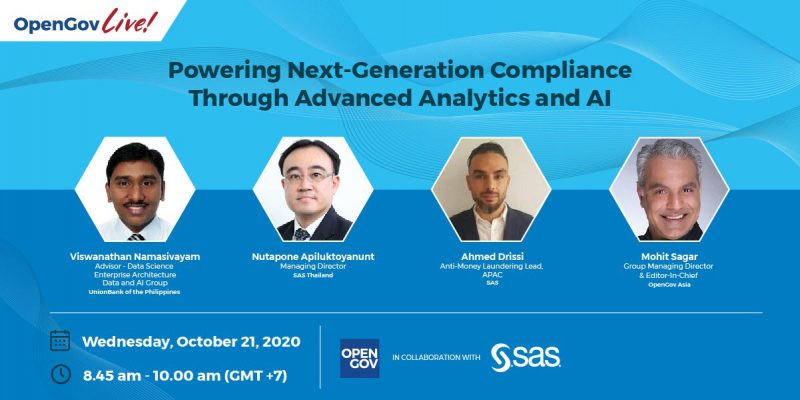
As the world moves towards the digitisation of the economy, the adverse impact of financial crime in banks and other financial institutions is accelerating rapidly. The shift to a work-from-home system as a result of the pandemic has increased the vulnerability of remote financial sector employees whose devices lack adequate security.
There is so much fraud that goes unidentified and cannot be accounted for. As a result, fraud prevention is one of the top areas of concern for the financial sector industry today.
To understand and alleviate the relevant pain points of digital executives from the financial sector industry in Thailand, OpenGov Asia hosted an OpenGovLive! Virtual Breakfast Insight that explored how Advanced Analytics, AI and Machine Learning can power the next-generation of compliance.
The full house of delegates at this event was a testimony to the relevance and importance of this topic among financial sector executives from Thailand.
Bad actors in the digital space are getting harder to identify as they are using the same technology as us

The event began promptly with Mohit Sagar, Group Managing Director and Editor-in-Chief, OpenGov Asia introducing participants and laying the ground for the discussion ahead.
Mohit emphasized the increased risk of fraud and money laundering in the financial sector industry in the current atmosphere. Bad actors in the digital space are leveraging the same advanced technology as legitimate organisations with a destructive mindset – and no restrictions of regulation and compliance.
This makes it imperative for financial sector institutions to augment and bolster their existing fraud protection through Advanced Analytics, AI and Machine Learning.
Mohit shed to light on the importance of sound leadership in these trying times and urged all to think as responsibly as leaders do.
He left the audience with advice to partner with experts who excel at utilising technology to strengthen compliance and fraud protection rather than losing this valuable time in understanding and enabling it themselves.
Innovation, adoption, and maturity: three phases of AI and ML adoption cycle in financial institutions

Ahmed: Other stakeholders in the industry recognizing and supporting the use of AI and ML in anti-money laundering initiatives
After Mohit’s opening, Ahmed Drissi, Anti-Money Laundering Lead, APAC, SAS elaborated on the detailed features of SAS’s money laundering solution. Ahmed spoke about the challenges in using traditional AML solutions and how SAS solutions overcome these shortcomings.
He further shared in detail of other the recognition and support for AI and ML in anti-money laundering initiatives by stakeholders in other industries.
Ahmed expounded on the three phases of AI and ML adoption cycle that include innovation, adoption, and maturity as demonstrated by various global and regional banks.
He shed some more light on the various AI/ML use cases in AML. These include entity resolution, customer segmentation, post alert scoring, model detection, tuning and optimisation. Being an expert in the field, he was able to articulately and authoritatively share details of the above-mentioned use cases with the delegates.
Banks and financial institutions must focus on simplifying and strengthening compliance

After Ahmed’s information-rich presentation, Viswanathan Namasivayam, Advisor for Data Science Enterprise Architecture, Data and AI Group at UnionBank Philippines gave his insights and opinions on the topic.
An advocate of simplification of compliance for banks and financial institutions, Viswanathan bases his conviction on the dramatic rise in fraud and hacking incidents he has observed.
He also believes in the power of advanced technology like AI/ML to mitigate these risks as it offers institutions the ability to go beyond a single representation of an individual or an entity, rendering a better understanding of the fraud risk.
Viswanathan shared a recent case study from Germany with the delegates to bring home the point that using AI in technology and security is inevitable in today’s world of increased cyber risk. The case study is a classic example of the consequences of failing to manage the risk associated with fintech companies. He also cautioned the audience that incidents like these would trigger more stringent and tighter regulations.
He completely agreed with Ahmed’s opinion about regulators and supervisors in the industry who also see a lot of value in using technology in this space.
Viswanathan concluded his presentation by pointing to the fundamental shift in financial institution’s approach in the handling of fraud incidences – moving from being reactive to proactive.
None the less, Vishwanathan ended on an optimistic note – acknowledging that this fundamental shift in institutions of becoming more proactive is a significant step for them in their journey towards a having a robust fraud and risk management system.
After these two insightful presentations, the event moved into the more participatory part of the session: polling and discussions.
On the question about the extent to which your organisation is incorporating AI/ML learning capabilities in your risk and compliance programmes, a majority of the delegates voted that they are using AI/ML across risk and compliance, including financial crime – watchlist filtering, sanction screening, and/or transaction monitoring (63%).
A senior delegate from a major bank shared that they are using AI and ML for other functions like data prediction and collection, sales, and contacting their customers but are still evaluating the advantages of AI to be implemented across all risk and compliance programmes.
On the next question about conducting or the need to conduct proper investigations on suspicious transactions and the availability of a sufficient platform to help with the investigation process, most delegates indicated that they have a platform providing these capabilities (63%).
Ahmed was happy to know about this trend and it was in keeping in with their expectation that most banks in Thailand have the proper platform and investigation tools in place.
On the final question about having a real-time fraud detection, prevention, and monitoring solution that is working together with an AML solution, the delegates overwhelmingly voted that they have a fraud system but it is separate from the AML solution (76%).
Another senior executive from a major bank shared that he voted for the above as they have two different departments taking care of fraud monitoring and anti-money laundering n their organisation. In the same vein, he shared that it would be good to have an integrated system over time.
After the polling session Nutapone Apiluktoyanunt, Managing Director, SAS Thailand came forward to close the session. He thanked all the delegates for taking the time to participate in the session and share their invaluable insights.
He also encouraged the delegates to reach out to team SAS if they have any questions or want to get more clarity on the solutions shared during the presentations.
















